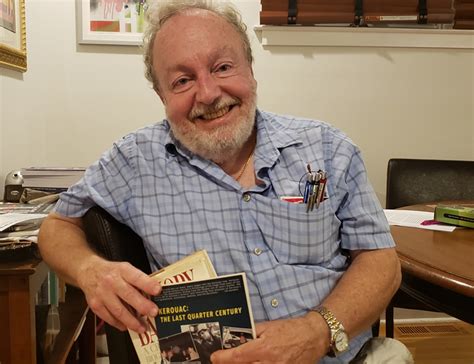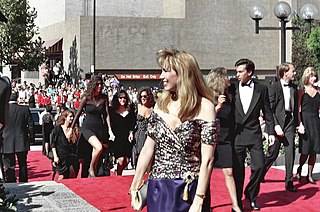A Quote by Joyce Johnson
Jack Kerouac seems to have been preoccupied with the question of duality from a very young age. He seemed to feel that there was more than one person inside him. Indeed he would veer from friendly, open and so on to someone who was angry. In a way, there was a swing also between his American self and what he later called his Franco-American older brother. There was a swing between the deeply introverted part of himself and the person he became out in the world, having to act in an extroverted way.
Quote Topics
Related Quotes
Lincoln is such an iconic figure in American history. He seems to reflect so many elements of American culture that we consider essential, whether it's the self-made man, the frontier hero, the politician who tries to act in a moral way as well as in a political way, Honest Abe. His career raises these questions that are still with us, the power of the federal government vis-à-vis the states, the question of race in American life, can we be a society of equals? There are so many issues central to Lincoln's career that are still part of our society one hundred and fifty years later.
Kerouac's books portray a hero and narrator free and easy, confident, sure of his rebellion against the American system. In reality, Jack was torn between Catholicism, Buddhism, and his own demon-driven pursuit of kicks, between spirit and flesh, between mom's house and the Beat coffeehouse, patriotism and subversion, men and women, society and solitude, carousing and meditation, sacred and profane, secular and divine. It's a miracle he survived as long as he did.
He was a very private person, and sometimes it seemed to me that he was no longer interested in the world or in other people... I got the feeling that Julián was living in the past, locked in his memories. Julián lived within himself, for his books and inside them - a comfortable prison of his own design." "You say this as if you envied him." "There are worse prisons than words.
If we, who live outside asylums, act as if we lived in a fictitious world- that is to say, if we are consistent with our beliefs- we cannot adjust ourselves to actual conditions, and so fall into many avoidable semantic difficulties. But the so-called normal person practically never abides by his beliefs, and when his beliefs are building for him a fictitious world, he saves his neck by not abiding by them. A so-called "insane" person acts upon his beliefs, and so cannot adjust himself to a world which is quite different from his fancy.
It is time to put up a love-swing!
Tie the body and then tie the mind so that they
swing between the arms of the Secret One you love,
Bring the water that falls from the clouds to your eyes,
and cover yourself inside entirely with the shadow of night.
Bring your face up close to his ear,
and then talk only about what you want deeply to happen.
And if someone felt that his life had been an utter failure, and that he himself was only one among millions of wholly unimportant people who could be replaced as easily as broken windowpanes, he would go and pour out his heart to Momo. And, even as he spoke, he would come to realize by some mysterious means that he was absolutely wrong: that there was only one person like himself in the whole world, and that, consequently, he mattered to the world in his own particular way. Such was Momo's talent for listening.
I'm not sure I would make a direct connection between having press attention as a young person and being interested in the media as an older person. I came to it more organically, coming from a family of Irish Catholic storytellers. Storytelling is a pastime and important part of my family's history and culture.
His name was Michael R. Ross. I've never known what the "R" was for. He died, however, before I was 7. But he and I seemed to have had quite a nice relationship. He always called me grandlady, and he'd always talk to you as a person rather than as a child. So, I would go with him for his routes in his horse and buggy. So, my memory of him is pretty sharp, plus it has been accentuated by the stories that come out of the family.
I think the contrast between these two in the professional world of cinema mattered to me. One who has reached the ultimate point of being a star, who knows how to do everything very well, facing another person who would throughout the making of the film transfer his anxiety to both of us, to me and to Juliette, as to whether or not he would be capable of fulfilling his role. This in itself created a challenge that was actually very good for me, since I hadn't ever counterposed two such performers before, creating that challenge between someone who knows their part and someone who doesn't.
The name, his true name, was weaker and more flawed than he would have liked, and he hated himself for that, but there was also much to admire within it, and the more he thought about it, the more he was able to accept the true nature of his self. He was not the best person in the world, but neither was he the worst.
If we apply the term revolution to what happened in North America between 1776 and 1829, it has a special meaning. Normally, the word describes the process by which man transforms himself from one kind of man, living in one kind of society, with one way of looking at the world, into another kind of man, another society, another conception of life.... The American case is different: it is not a question of the Old Man transforming himself into the New, but of the New Man becoming alive to the fact that he is new, that he has been transformed already without his having realized it.
It never occurred to him that now he was looking at his master, at the one person in all the world who held his fate right between her palms - me, in patched hand-me-downs and untrimmed hair and idiot smile - and that my hatred for him is pure and black and unforgiving. And that I don't believe in God, but if I did, if I did, it would be the God of Moses, angry and demanding and OUT FOR REVENGE.
I think that, in our culture, we find older people to be almost invisible, and it's such a shame. The one thing, the one condition that we all suffer from, and that we all benefit from, is ageing. It starts at zero and we're all going in the same direction, and I always try to see the young person underneath the older person and that's all of us. We all feel the same way inside, and I think that there are so many ways for us to age well and to help our senior population get to the golden years with more dignity more independent and more enjoyment.



































